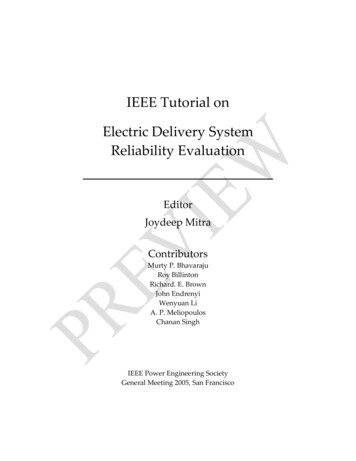
Transcription
IEEE Tutorial onElectric Delivery SystemReliability EvaluationEditorJoydeep MitraContributorsMurty P. BhavarajuRoy BillintonRichard. E. BrownJohn EndrenyiWenyuan LiA. P. MeliopoulosChanan SinghIEEE Power Engineering SocietyGeneral Meeting 2005, San Francisco
SponsorsThis tutorial is sponsored by the Reliability, Risk and Probability Applications (RRPA) subcommittee,which is chaired by Prof. James D. McCalley, and by the Lifelong Learning subcommittee, which ischaired by Prof. Elham B. Makram. The RRPA is a subcommittee of the Power System Analysis,Computation and Economics (PSACE) committee, and Lifelong Learning is a subcommittee of the PowerEngineering Education Committee (PEEC) of the Power Engineering Society.iii
Contributors1. Analytical Techniques for Bulk Power System Reliability AssessmentProf. A. P. Meliopoulos, Georgia Institute of Technology2. Monte Carlo Simulation and Intelligent Search MethodsProf. Chanan Singh, Texas A&M University, and Prof. Joydeep Mitra, New Mexico State University3. Distribution System Reliability: Analytical and Empirical TechniquesDr. Richard E. Brown, KEMA T&D Consulting4. Data Requirements, Practices and RecommendationsProf. Roy Billinton, University of Saskatchewan5. Reliability and MaintenanceDr. John Endrenyi, Kinectrics, Inc.6. Generation System Reliability in Competitive MarketsDr. Murty P. Bhavaraju, PJM Interconnection7. Application of Reliability Evaluation in Transmission PlanningDr. Wenyuan Li, British Columbia Transmission Corporationiv
Prefaceam pleased to present to the community this timely and important tutorial on Electric DeliverySystem Reliability Evaluation. At a time when the entire international community has witnessedseveral large outages worldwide within a period of less than two years, and more people than everbefore are asking questions about the reliability of present day electric delivery systems, it is importantfor members of the energy engineering community to develop an understanding of the concepts andissues related to the reliability of the electric delivery system, particularly in the context of the prevailingpolitical and regulatory climate.IThis tutorial will be of value to everyone involved with electric energy systems — practicingengineers, policy makers, students and academics. The contents comprise a balance of fundamentalconcepts and practical and modern day applications, and are presented by some of the best known expertsin the field.In preparing this tutorial, our focus has been to cover issues that are both fundamental and of practicaland contemporary relevance. The topics covered have been carefully selected and organized to meet theseobjectives. The electric delivery infrastructure consists of bulk power systems and distribution systems.The fundamental methods of analyzing these systems for reliability have been presented. Analytical,empirical and simulation-based methods have been discussed. It was recognized that the actual use andapplication of these methods are contingent upon the availability and understanding of data, and so achapter has been devoted to the treatment of this important topic. Finally, some of the most importantareas of application have been addressed — maintenance and planning. Over the past decade, theintroduction of competition, open access and environmental issues have presented some unprecedented,complex challenges to the reliable operation of the electric power system. Some of the major issues andparadigms have been identified and discussed.The approach of the tutorial is as follows. The basic concepts are presented in an intuitive and easyto-understand manner. Some of the key methods and ideas are explained in some detail, and accompaniedby examples and illustrative flow-charts. Other methods are briefly discussed and ample referencesprovided. In an attempt to ensure completeness of coverage of relevant topics, the text itself providesconsiderably more information than is presented at the tutorial. However, it is expected that importantcontributions by many others may not have been highlighted explicitly, but can be found in thereferences.Much work has been put into the preparation of this tutorial, and it is imperative that I express mysincerest gratitude to every one of the contributors for preparing this excellent material, and to the manypeople who gave me valuable counsel in the organization of this tutorial, particularly Narayan Rau, JimMcCalley, Alex Schneider and Satish Ranade. My own reward for the countless hours spent onorganizing this effort and editing the text is the joy of working and sharing with such outstanding people.I hope that the participants at the tutorial and other readers of this text will find this book as usefuland informative as I did.Joydeep MitraMarch 2005v
viIEEE TUTORIAL ON ELECTRIC DELIVERY SYSTEM RELIABILITY EVALUATION
ContentsPrefacev11Analytical Techniques for Bulk Power System Reliability Assessment1.11.21.31.41.5IntroductionGenerating System Reliability MethodsGenerating System Reliability Analysis ApplicationsAnalytical Network MethodsConclusion13811202Monte Carlo Simulation and Intelligent Search Methods2.1 Introduction2.2 Basic Procedure2.3 Random Sampling2.5 Estimating Reliability Measures2.6 Equilibrium Conditions and Sample Size2.7 Monte Carlo Simulation for Power System Reliability Assessment2.8 Intelligent Search Techniques23232426293031353Distribution System Reliability: Analytical and Empirical Techniques3.1 Introduction3.2 Distribution Operations3.3 Analytical Simulation3.4 Calibration with Empirical Observations3.5 Analytical/Monte Carlo Hybrid Simulation3.6 Conclusions393940424448504Reliability Data Requirements, Practices and Recommendations4.1 Introduction4.2 Component Reliability Data4.3 System Performance Data4.4 Discussion52525361665Reliability and Maintenance5.1 Introduction5.2 Review of Maintenance Approaches5.3 A Deterministic Mathematical Model5.4 Linking Reliability and Maintenance: A Probabilistic Approach5.5 Deterministic or Probabilistic Approach?5.6 Component and System Reliability5.7 ConclusionsAppendix: Terminology686869727276777880vii
viiiIEEE TUTORIAL ON ELECTRIC DELIVERY SYSTEM RELIABILITY EVALUATION6Generation System Reliability in Competitive MarketsPart A: Summary6.1 Introduction6.2 Regulated Systems6.3 Deregulated Environment6.4 Achieving Adequate Generation in Deregulated Environment6.5 ConclusionPart B: Presentation82828282838485867Application of Reliability Evaluation in Transmission Planning7.1 Introduction7.2 Concept of Probabilistic Planning7.3 Reliability Evaluation Approach7.4 Example 1: Selecting the Lowest Cost Planning Alternative7.5 Example 2: Applying Different Planning Criteria7.6 Conclusions96969799101107114
Contributor BiographiesMurty P. Bhavaraju (M ’68, SM ’74, F ’87) worked for 35 years with Public Service Electric & GasCompany and joined PJM Interconnection as Senior Consultant. His interest has been power systemplanning with special focus on reliability assessments. (e-mail: m.p.bhavaraju@ieee.org)Roy Billinton (S ’59, M ’64, SM ’73, F ’78) came to Canada from England in 1952. He obtained theB.Sc. and M.Sc. degrees from University of Manitoba, and the Ph.D. and D.Sc. degrees in electricalengineering from the University of Saskatchewan, Canada. He was with the System Planning andProduction Divisions of Manitoba Hydro. He joined the University of Saskatchewan in 1964. He is theauthor and co-author of eight books on reliability evaluation and over 800 papers on power systemreliability evaluation, economic system operation and power system analysis. Dr. Billinton is a Fellow ofthe IEEE, the EIC, the Canadian Academy of Engineering, and the Royal Society of Canada, and aRegistered Professional Engineer in the Province of Saskatchewan, Canada. (e-mail:roy.billinton@usask.ca)Richard E. Brown (SM ’00) is a senior principal consultant with KEMA, and specializes in powersystem reliability and asset management. He is the author of more than 60 technical papers and the bookElectric Power Distribution Reliability. He is a senior member of the IEEE and recipient of its 2003Walter Fee Outstanding Young Engineer award. Dr. Brown received his BSEE, MSEE, and PhD from theUniversity of Washington and his MBA from the University of North Carolina at Chapel Hill. He is aregistered professional engineer. (e-mail: rebrown@kema.com)John Endrenyi (M ’59, SM ’76, F ’87, LF ’94) is Principal Scientist Emeritus at Kinectrics, Toronto(formerly Ontario Hydro Technologies), and an Adjunct Professor at the University of Toronto. Hereceived a Diploma of Electrical Engineering from the Technical University of Budapest, the MAScdegree from the University of Waterloo (Ontario) and the Ph.D. from the University of Toronto. Afterseven years of teaching and research in Hungary, he joined Ontario Hydro’s Research Division in 1959where he was first engaged in station and transmission line studies and, later, in the development ofprobabilistic models for power system reliability. He has contributed to the methodology of powersystem reliability and maintenance through numerous papers, seminars, a book, and participation inseveral IEEE, EPRI, CIGRE and IEC committees. Dr. Endrenyi is a registered Professional Engineer inthe Province of Ontario. (e-mail: john.endrenyi@kinectrics.com)Wenyuan Li (F ’02) is currently a Principal Engineer at BCTC in Canada and an advisory professorof Chongqing University in China. He is the author/co-author of a considerable number of papers inpower system planning, economic operation, optimization and reliability, the co-author of the book“Reliability Assessment of Electrical Power Systems Using Monte Carlo Methods”, Plenum Press, NewYork, 1994, and the author of the book “Risk Assessment of Power Systems: Models, Methods, andApplications”, IEEE Press and Wiley & Sons, 2005. He also completed more than fifty technical reportsin system planning, operation and risk assessment. Dr. Li was the winner of the 1996 “OutstandingEngineer” awarded by the IEEE Canada for his “contributions in power system reliability andprobabilistic planning”. (e-mail: wen.yuan.li@bctc.com)ix
xIEEE TUTORIAL ON ELECTRIC DELIVERY SYSTEM RELIABILITY EVALUATIONA. P. Sakis Meliopoulos (M ’76, SM ’83, F ’93) was born in Katerini, Greece, in 1949. He receivedthe M.E. and E.E. diploma from the National Technical University of Athens, Greece, in 1972; theM.S.E.E. and Ph.D. degrees from the Georgia Institute of Technology in 1974 and 1976, respectively. In1971, he worked for Western Electric in Atlanta, Georgia. In 1976, he joined the Faculty of ElectricalEngineering, Georgia Institute of Technology, where he is presently a professor. He is active in teachingand research in the general areas of modeling, analysis, and control of power systems. He has madesignificant contributions to power system grounding, harmonics, and reliability assessment of powersystems. He is a leading contributor to the computer model TRELSS. He is the author of the books,Power Systems Grounding and Transients, Marcel Dekker, June 1988, Ligthning and OvervoltageProtection, Section 27, Standard Handbook for Electrical Engineers, McGraw Hill, 1993. He holds threepatents and he has published over 200 technical papers. Dr. Meliopoulos is the Chairman of the GeorgiaTech Protective Relaying Conference, a Fellow of the IEEE and a member of Sigma Xi. He has beennamed the recipient of the 2005 IEEE Richard H. Kaufman Award. (e-mail: ameliopo@ece.gatech.edu)Joydeep Mitra (S ’94, M ’97, SM ’02) is currently Associate Professor of Electrical Engineering andAssociate Director of the Electric Utility Management Program at New Mexico State University, LasCruces. Dr. Mitra has five years of industrial experience in Engineering and Consulting, and five years ofacademic experience as faculty at North Dakota State University and New Mexico State University. He isa Senior Member of the IEEE, and recipient of an NSF Career Award. His research interests includepower system reliability, distributed energy resources, and power system planning. (e-mail:jmitra@nmsu.edu)Chanan Singh (S ’71, M ’72, SM ’79, F ’91) is currently Regents Professor, J.W. Runyon Professorand Department Head of Electrical Engineering at Texas A&M University, College Station. He served asDirector of the NSF Power System Program from 1995 to 1996. His research and consulting have beenfocused on power system reliability. He is author/coauthor of two books, several book chapters andnumerous publications. He is a Fellow of IEEE and recipient of the IEEE 1998 Outstanding PowerEngineering Educator Award. In 1997, the University of Saskatchewan awarded him a DSc for hiscontributions to research and education in power system reliability. (e-mail: singh@ee.tamu.edu)
Richard E. Brown (SM ’00) is a senior principal consultant with KEMA, and specializes in power system reliability and asset management. He is the author of more than 60 technical papers and the book Electric Power Distribution Reliability. He is a senior member of the IEEE and recipient of its 2003 Walter Fee Outstanding Young Engineer award. Dr. Brown received his BSEE, MSEE, and PhD from .
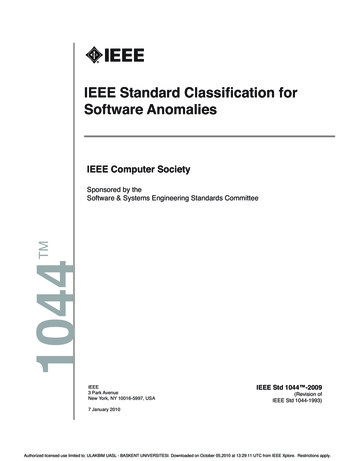

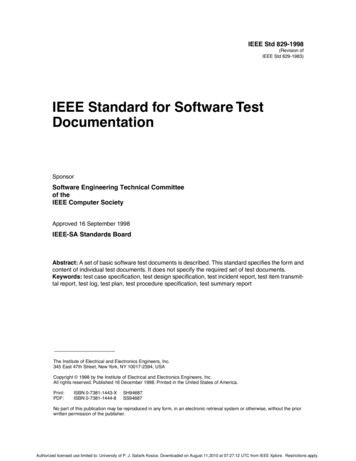
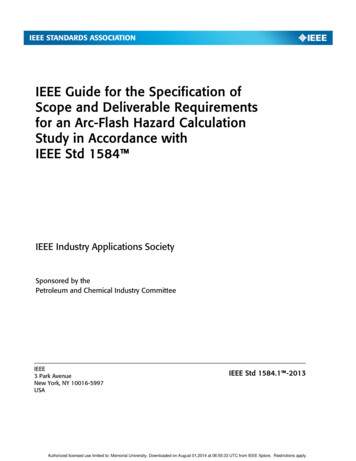
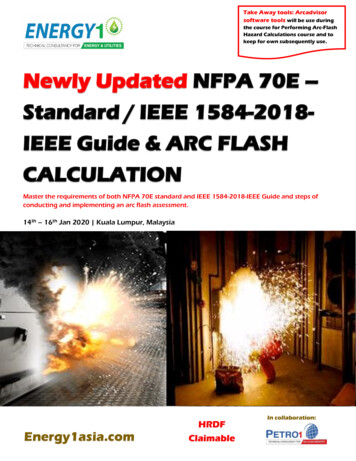
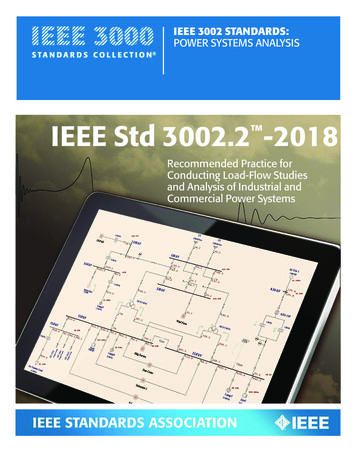
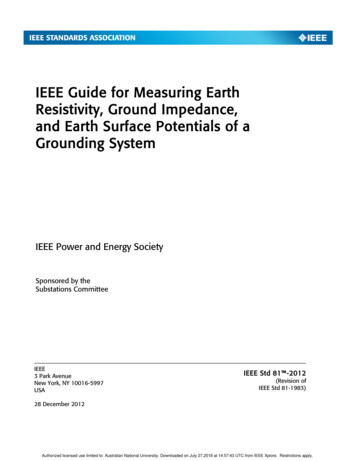
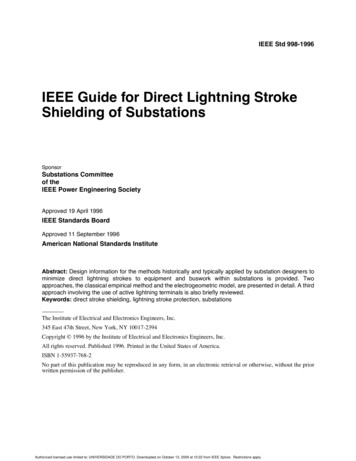
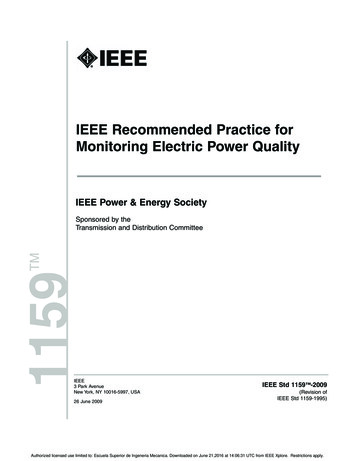

![Unreal Engine 4 Tutorial Blueprint Tutorial [1] Basic .](/img/5/ue4-blueprints-tutorial-2018.jpg)
